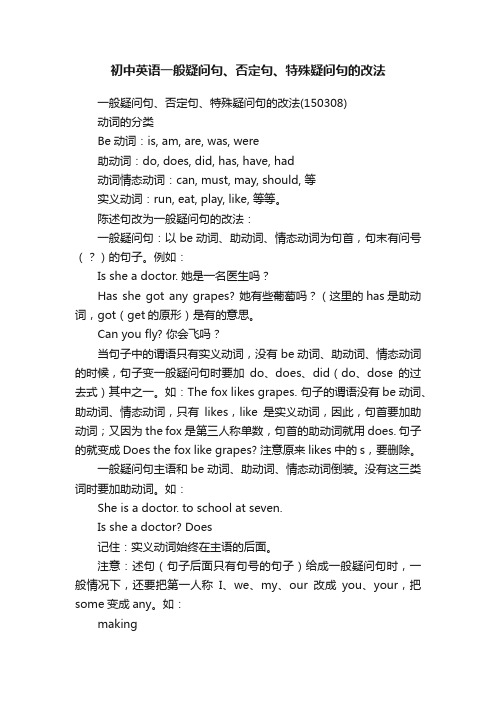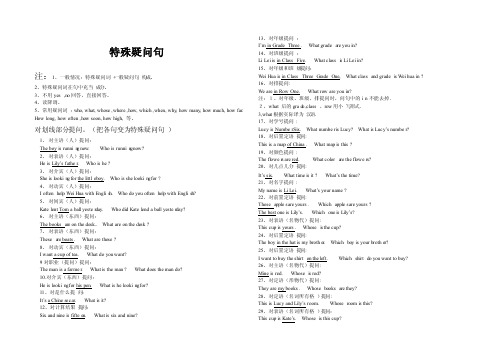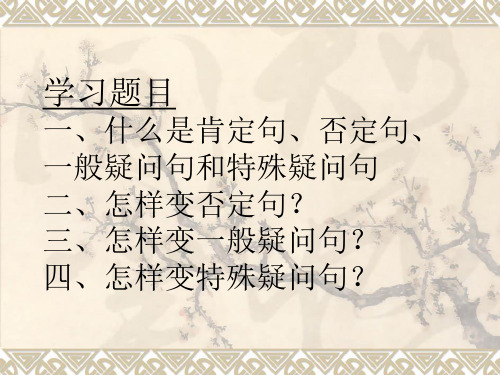一般疑问句和特殊疑问句变法
句子变换一般疑问句与特殊疑问句

句子变换一般疑问句与特殊疑问句句子变换:一般疑问句与特殊疑问句在英语语法中,句子变换是指将陈述句转换为疑问句或反过来的过程。
疑问句可以分为一般疑问句和特殊疑问句,它们在句法结构和语序上有所不同,需要我们在理解和运用时熟练掌握。
本文将介绍一般疑问句和特殊疑问句的变换规则和例子,并探讨它们在交流中的应用。
一、一般疑问句一般疑问句是一种以助动词、系动词或情态动词开头的疑问句,其结构为:助动词/系动词/情态动词 + 主语 + 其他部分。
例如:1. You are a teacher.(你是一名老师。
)Are you a teacher?(你是老师吗?)2. He can swim.(他会游泳。
)Can he swim?(他会游泳吗?)3. They have finished their homework.(他们已经完成了作业。
)Have they finished their homework?(他们完成作业了吗?)4. She has been to France.(她去过法国。
)Has she been to France?(她去过法国吗?)1. 助动词/系动词/情态动词的变换:将助动词/系动词/情态动词放在句子的句首,并使用主语和其他部分保持原来的语序。
2. 一般疑问句的回答:一般疑问句的回答通常是"Yes"或"No",而且回答时需要用到助动词/系动词/情态动词。
以第一个例子为例,回答可以是"Yes, I am."或"No, I am not."二、特殊疑问句特殊疑问句是以特殊疑问词(如who, what, when, where, why, how 等)开头的疑问句,用于询问具体事实、情况或原因。
特殊疑问句的结构为:特殊疑问词 + 助动词/系动词/情态动词 + 主语 + 其他部分。
例如:1. He goes to school by bus.(他乘公交车去学校。
初中英语一般疑问句、否定句、特殊疑问句的改法

初中英语一般疑问句、否定句、特殊疑问句的改法一般疑问句、否定句、特殊疑问句的改法(150308)动词的分类Be动词:is, am, are, was, were助动词:do, does, did, has, have, had动词情态动词:can, must, may, should, 等实义动词:run, eat, play, like, 等等。
陈述句改为一般疑问句的改法:一般疑问句:以be动词、助动词、情态动词为句首,句末有问号(?)的句子。
例如:Is she a doctor. 她是一名医生吗?Has she got any grapes? 她有些葡萄吗?(这里的has是助动词,got(get的原形)是有的意思。
Can you fly? 你会飞吗?当句子中的谓语只有实义动词,没有be动词、助动词、情态动词的时候,句子变一般疑问句时要加do、does、did(do、dose的过去式)其中之一。
如:The fox likes grapes. 句子的谓语没有be动词、助动词、情态动词,只有likes,like是实义动词,因此,句首要加助动词;又因为the fox是第三人称单数,句首的助动词就用does. 句子的就变成Does the fox like grapes? 注意原来likes中的s,要删除。
一般疑问句主语和be动词、助动词、情态动词倒装。
没有这三类词时要加助动词。
如:She is a doctor. to school at seven.Is she a doctor? Does记住:实义动词始终在主语的后面。
注意:述句(句子后面只有句号的句子)给成一般疑问句时,一般情况下,还要把第一人称I、we、my、our改成you、your,把some变成any。
如:making变成:Have you got any apples? Are you your aeroplane?We are watching TV. 变成:Are you watching TV?还要注意:如果has、have、had、do、does、did后面是名词时,has、have就不是助动词了,他们是实义动词。
各种特殊疑问句的变法及易出错的各种情况

特殊疑问句注:1、一般情况:特殊疑问词+一般疑问句构成。
2、特殊疑问词在句中充当成分。
3、不用yes ,no回答,直接回答。
4、读降调。
5、常用疑问词:who, what, whose, where, how, which, when, why, how many, how much, how far. How long, how often, how soon, how high, 等。
对划线部分提问。
(把各句变为特殊疑问句)1、对主语(人)提问:The boy is running now. Who is running now?2、对表语(人)提问:He is Lily’s father. Who is he ?3、对介宾(人)提问:She is looking for the little boy. Who is she looking for ?4、对动宾(人)提问:I often help Wei Hua with English. Who do you often help with English?5、对间宾(人)提问:Kate lent Tom a ball yesterday. Who did Kate lend a ball yesterday?6、对主语(东西)提问:The books are on the desk.. What are on the desk ?7、对表语(东西)提问:These are boats. What are these?8、对动宾(东西)提问:I want a cup of tea. What do you want?9对职业(提问)提问:The man is a farmer. What is the man ? What does the man do?10.对介宾(东西)提问:He is looking for his pen. What is he looking for?11、对是什么提问:It’s a Chinese car. What is it?12、对计算结果提问:Six and nine is fifteen. What is six and nine? 13、对年级提问:I’m in Grade Three. What grade are you in?14、对班级提问:Li Lei is in Class Five. What class is Li Lei in?15、对年级和班级提问:Wei Hua is in Class Three Grade One, What class and grade is Wei hua in ?16、对排提问:We are in Row One. What row are you in?注:1、对年级、班级、排提问时,问句中的in 不能去掉.2,what 后的grade ,class ,row用小写形式.3,what根据实际译为汉语.17、对学号提问:Lucy is Number Six. What number is Lucy? What is Lucy’s number? 18、对后置定语提问:This is a map of China. What map is this ?19、对颜色提问:The flowers are red. What color are the flowers?20、对几点几分提问:It’s six. What time is it ? What’s the time?21、对名字提问:My name is Li Lei. What’s your name ?22、对前置定语提问:These apples are yours. Which apples are yours?The best one is Lily’s. Which one is Lily’s?23、对表语(名物代)提问:This cup is yours. Whose is the cup?24、对后置定语提问:The boy in the hat is my brother. Which boy is your brother?25、对后置定语提问:I want to buy the shirt on the left. Which shirt do you want to buy?26、对主语(名物代)提问:Mine is red. Whose is red?27、对定语(形物代)提问:They are my books. Whose books are they?28、对定语(名词所有格)提问:This is Lucy and Lily’s room. Whose room is this?29、对表语(名词所有格)提问:This cup is Kate’s. Whose is this cup?30对身体提问:I’m fine (well, OK, All right.) How are you?31、对年龄提问:The boy is fifteen. How old are you?32、对天气提问:It’s cloudy today. How is the weather today? =What’s the weather like today?33、对语言提问:I can spell it in English. How can you spell it?34、对方式提问:I often go to school on foot.(by bus ,by train , by bike···) How do you often go to school?35、对程度提问:She studies hard. How does she study?36、对数量提问:1,There are five birds in the tree. How many birds are there in the tree?2,There is much water in the bottle. How much water is there in the bottle ?3,There is an apple tree in front of the house. How many apple trees are there in front of the house?37、对价格提问:The meat is ten yuan . How much is the meat?注:1,对价格提问,be 应根据后面的主语而定。
各种特殊疑问句的变法及易出错的各种情况

We are in Row One. What row are you in?
注:1、对年级、班级、排提问时,问句中的 i n 不能去掉.
2,what 后的 gra de ,class ,row 用小 写形式.
3,what 根据实际译为 汉语.
17、对学号提问:
Lucy is Numbe rSix. What numbe ris Lucy? What is Lucy’s numbe r?
45、对宽度提问 :
The river is five metre swide. How wide is the river ?
46、对原因状语 提问: He didn’t come to schoo lbecau se he was ill in bed. Why didn’t he come to schoo l? 注:表示“因为”的连词有 s ince, as , for, becau se. 47、对时间状语 提问: We usual ly come to schoo lat seven in the morni ng. When do you usual ly come to schoo l? 48、对地点状语 提问: The child ren somet imes play footb all on the playg round . Where do the child ren somet imes play footb all? 49、对几月几日 提问: It’s May 2 today . What’s the date today ? 50、对种类(后置定语)提问: I want the cakes with nuts in them . What kind of cakes do you want? 51、对作什么提 问: The boys are playi ng in the tree. What are the boys doing in the tree?
怎样变一般疑问句、否定句和特殊疑问句

二、怎样变否定句
有am,
is, are的句子, 肯定句变否定句:在am, is, are后面加上not,其 余按顺序照抄。 例如:I am a boy. I am not a boy. He is a teacher. He is not a teacher. They are friends. They are not friends. 他们是朋友。 他们不是朋友。
学习题目
一、什么是肯定句、否定句、 一般疑问句和特殊疑问句 二、怎样变否定句? 三、怎样变一般疑问句? 四、怎样变特殊疑问句?
一、be动词:am,
is, are 二、肯定句、否定句、一般疑问句和特殊 疑问句定义 1.肯定句:表示肯定的意思, 即不含有否 定词“不”。 比如:我是一个学生 I am a student. 他是一个老师。He is a teacher. 2.否定句:表示否定的意思。 比如:我不是一个男孩。 I am not a boy 他不是一个老师。 He is not a teacher.
一般疑问句:回答为“是yes”或者“否no” 的问句。 比如:你是一个学生吗? Are you a student? Yes, I am./No, I am not. 4. 特殊疑问句:回答不是“是yes”或者“否 no”的问句,而是根据提问内容具体回答。 比如:这是什么? What’s this? It is a map.
四、怎样变特殊疑问句?
就划线部分提问(变特殊疑问句)
This
is a book. 第一步:变一般疑问句 Is this a book? 第二步:找合适的特殊疑问词 Is this what ? 第三步:特殊疑问词提前放到句首,并大写, 其余按顺序照抄,省略划线部分。得出正确 答案:What is this?
怎么变一般疑问句及特殊疑问句2

怎么变一般疑问句及特殊疑问句2英语怎样变句型一般疑问句否定句反问句肯定句画线提问1. 由连系am,is,are构成的句子:变一般疑问句时把am,is,are提到句子的前面,句尾用问号即可。
变否定句时直接在am,is,are后面加not即可。
例如: 肯定句:He is a student.一般疑问句: Is he a student?否定句: He is not a student.反问句: He is a student, isn't he?He isn't a student, is he?画线提问: 对he提问: Who is a student?对 a student 提问: What is he? or What does he do? 2. 由情态动词can, may, should等构成的句子: 变一般疑问句时把can,may,提到句子的前面,句尾用问号即可.变否定句时直接在can,may,后面加not即可. 例如:肯定句: She can swim.一般疑问句: Can she swim?否定句: She can not swim.反问句: She can swim, can't she?She can not swim, can she?画线提问: 对she提问: Who can swim?对swim提问: What can she do?3. 由行为动词构成的句子: 需要加助词do或does. 变一般疑问句时把do/does放在句子前面. 例如: 肯定句: They play football after school. 一般疑问句: Do they play football after school? 否定句: They don't (do not) play football after school.反问句: They play football after school, don't they?They don't play football after school, do they? 画线提问: 对they提问: Who play football after school? 对play football提问: What do theydo after school? 对after school提问: When do they play football? 注意:在变换句子时要注意人称的变化,第一人称变为第二人称(如I,we---youmy,our—your)1、动词是表示动作或状态的词。
根据动词疑问形式的变化规则总结
根据动词疑问形式的变化规则总结一、一般疑问句的变化规则:1. 对于一般现在时,直接将助动词do / does置于句首。
例如:- He plays football. → Does he play football?- They eat breakfast. → Do they eat breakfast?2. 对于一般过去时,直接将助动词did置于句首。
例如:- She danced at the party. → Did she dance at the party?- We watched a movie. → Did we watch a movie?3. 对于一般将来时,直接将助动词will置于句首。
例如:- He will go to the concert. → Will he go to the concert?- They will visit their grandparents. → Will they visit their grandparents?二、特殊疑问句的变化规则:1. 对于一般现在时和一般过去时,将特殊疑问词置于句首,其余部分保持原来的词序。
例如:- What does he want?(一般现在时)- Where did she go?(一般过去时)2. 对于一般将来时,将特殊疑问词置于句首,然后将助动词will置于主语之前。
例如:- When will they arrive?(一般将来时)三、选择疑问句的变化规则:1. 对于一般现在时和一般过去时,将助动词置于句首,然后在句子中加入or。
例如:- Does she like coffee or tea?(一般现在时)- Did you go to the party or stay at home?(一般过去时)2. 对于一般将来时,将助动词will置于句首,然后在句子中加入or。
例如:- Will he travel by plane or train?(一般将来时)总结:根据动词疑问形式的变化规则,我们可以在使用各种时态和疑问句构造中做到准确表达。
小学英语一般疑问句和特殊疑问句总结
小学语法之疑问句一、一般疑问句1、定义: 用Yes或No作答的疑问句叫一般疑问句。
2、特点:1、以be动词、助动词或情态动词开头;例:Is your father a teacher? Does Tom like apples? Can Jenny speak English? 2、句末读升调3、肯定陈述句变一般疑问句的方法:1> 看句中有无be动词(am、is、are、was、were)或情态动词(can),如果有,将其提到句首,句末加问号。
例:It was rainy yesterday.→Was it rainy yesterday?Tom's father can play the piano.→Can Tom's father play the piano?2>如果句中没有be动词或情态动词,主语前加助动词(一般现在时do、does、一般过去时did),且原句的谓语动词要变回原形。
1.They go to school by bike. →Do they go to school by bik e?2.Bill gets up at 6:30 every day. →Does bill gets up at 6:30 every day?3.The students saw a film yesterday. →Did the students see a film yesterday?注: 1.如果陈述句中有第一人称,则变问句时要变为第二人称。
I usually have lunch at school. →Do you usually have lunch at s chool?2.如果陈述句中有some, 则变问句时往往要变成any 。
There is some water on the playground. →Is there any water on the playground 4、一般疑问句的回答:肯定回答Yes,主语+ be/can/ do,does,did否定回答No, 主语+ be/can/ do,does,did的not否定形式缩写.。
一般疑问句、否定句、特殊疑问句的改法
简易英语语法动词的分类Be动词:is, am, are, was, were助动词:do, does, did, has, have, had动词情态动词:can, must, may, should, 等实义动词:run, eat, play, like, 等等。
陈述句改为一般疑问句的改法:一般疑问句:以be动词、助动词、情态动词为句首,句末有问号(?)的句子。
例如:Is she a doctor. 她是一名医生吗?Has she got any grapes? 她有些葡萄吗?(这里的has是助动词,got(get的原形)是有的意思。
Can you fly? 你会飞吗?当句子中的谓语只有实义动词,没有be动词、助动词、情态动词的时候,句子变一般疑问句时要加do、does、did(do、dose的过去式)其中之一。
如:The fox likes grapes. 句子的谓语没有be动词、助动词、情态动词,只有likes,like是实义动词,因此,句首要加助动词;又因为the fox是第三人称单数,句首的助动词就用does. 句子的就变成Does the fox like grapes? 注意原来likes中的s,要删除。
一般疑问句主语和be动词、助动词、情态动词倒装。
没有这三类词时要加助动词。
如:She is a doctor. to school at seven.Is she a doctor? Does记住:实义动词始终在主语的后面。
注意:述句(句子后面只有句号的句子)给成一般疑问句时,一般情况下,还要把第一人称I、we、my、our改成you、your,把some变成any。
如:making变成:Have you got any apples? Are you your aeroplane?We are watching TV. 变成:Are you watching TV?还要注意:如果has、have、had、do、does、did后面是名词时,has、have就不是助动词了,他们是实义动词。
英语怎么改一般疑问句和特殊疑问句
英语怎么改一般疑问句和特殊疑问句?我举个非常简单的例子。
My name is John.接下来我们来改一般疑问句,一般疑问句我们的回答首先要知道,是以YES NO的形式来回答一般疑问句的,所以改一般疑问句的时候要和YES NO搭配起来,就像:is your name John?回答是什么?yes,my name is john,这个就是一般疑问句,特殊疑问句的话除了一般疑问句外基本上都是特殊疑问句,基本上都是以what where which who whose等等等等的疑问代词来提问居多,还是老例子,what is your name?my name is John 这个就是特殊疑问句的问和答了,有感觉了没?懂了吗?一、改一般疑问句通常分一下几种情况: 1、原句的谓语动词是be 动词(am,is,are,was,were...)或情态动词(can,may,could,will...),则将句中的be动词或情态动词提至句前,句子其他部分的语序不变,标点变为问号。
eg.1.You are a teacher.——Are you a teacher? 2.You are working.——Are you working? 3.They can sing and dance.——Can they sing and dance?2、原句的谓语动词是实义动词,则需根据原句的主语借助助动词,原句中的动词用原型。
eg.1.I like music.——Do you like music?2.Wang Hong likes music.——Does Wang Hong like music? ps. 以上只提到了现在时态的一些情况,但是改一般疑问句不论时态,通常都适用以上规则。
二、改特殊疑问句简单来说就是针对原句中的不同内容用不同的特殊疑问词来提问,特殊疑问词就是:what,when,where,which,who,whose,how 举例来说: Jim alwaysgoes to school on foot at seven. 1. 用who 来提问:也即是说对划线部分提问,Jim always goes to school on foot at seven. Who always goes to school on foot at seven? 2. 用when来提问,也即是说对划线部分提问,Jim always goes to school on foot at seven. When does Jim always go to school? 3.用how来提问,也即是说对划线部分提问,Jim always goes to school on foot at seven. How does Jim always go to school at seven? 例句2. Lily’s cat is black and white. 1.用whose来提问,也即是说对划线部分提问,Lily’s cat is black and white. Whose cat is black and white?2. 用what来提问,也即是说对划线部分提问,Lily’s cat is black and white. What color is Lily’s cat?特殊疑问句,是带有疑问词的句型,疑问词主要有what how who where when which whose why等等,一般疑问句,则是由系动词be/助动词/情态动词引导的句型,回答可以用yes 或no,所以,假如要把一般疑问句改成特殊疑问句,首先,你就要明白是对什么提问,比如Is your father a teacher? 这是一般疑问句,改成特殊疑问句,假如对father提问,则:Who is a teacher?假如对a teacher 提问,则是:What is your father?。
- 1、下载文档前请自行甄别文档内容的完整性,平台不提供额外的编辑、内容补充、找答案等附加服务。
- 2、"仅部分预览"的文档,不可在线预览部分如存在完整性等问题,可反馈申请退款(可完整预览的文档不适用该条件!)。
- 3、如文档侵犯您的权益,请联系客服反馈,我们会尽快为您处理(人工客服工作时间:9:00-18:30)。
一般疑问句和特殊疑问句变法
把一个陈述句变成一个一般疑问句
首先要看句子是什么时态如果是一般现在时或一般过去时的句子(这两中时态的陈述句中一般没有助动词)要在句首加一个助动词(do/does/did)
一、一般现在时:
They often go to the park at the weekends.---Do they often go to the
park at the weekends?
I often do some shopping on Sunday.--- ---Do you often do some shopping on Sunday?
His mother usually washes clothes on Saturday.Does his mother usually wash clothes on Saturday?
Tom often does his homework in the evening.-------Does Tom often do his homework in the evening?
二、一般过去时:
We went to the concert last Sunday.-------Did you go to the concert last Sunday?
He did some washing yesterday.---------Did he do some washing yesterday?注意:1、第二个例句中句首的do 是助动词,often后的 do是主要动词。
2、一般现在时第三人称单数作主语时,(变问句时)用does;一般过去时(这种时态的
谓语动词用过去式,而过去式除了be动词外,没有人称和数的变化,既:
不论是第一、
第二还是第三人称,不论单数还是复数,都用过去式)用did 。
3、do/does/did 后边的主要动词要用原形,尤其是后两个要注意把原句
(陈述句)中的动词改为原形。
如果是其它时态(除一般现在和一般过去两种时态外,谓语中都有助动词)将助动词移置句首即可变成一般疑问句。
三、现在进行时
I am speaking.-------Are you speaking? He is watching TV.------Is he watching TV.
They are playing basketball.--------Are they playing basketball?
四、过去进行时
Lily was doing her homework at that time. --------Was Lily doing her homework at that time?
The students were having an English lesson this time yesterday. -------Were the students having an English lesson this time yesterday?
五、一般将来时
They will go to the park by bus.---------Will they go to the park by bus?
We are going to visit the Science Museum next Sunday-------Are you going to visit the Science Musuem next Sunday?
六、现在完成时
I have finished my homework.--------Have you finished your homework? He has come.--------Has he come?
如果谓语是系动词be (am is are was were) 将be动词移到句首。
I am a nurse.------Are you a nurse? She is an American girl.-------Is she an American girl?
They are in the classroom.-------Are they in the classroom?
特殊疑问句:特殊疑问词+一般疑问句子(疑问词作主语除
外)
变特殊疑问句就是把句中被提问的部分(划线部分)用一个恰当的疑问词代替置于句首,再把原句变成一个一般疑问句。
如:He does his homework at home in the evening.一句
1、对句中的地点at home进行提问用where Where does he do his homework in the evening?
2、对句中的时间in the evening进行提问用when When does he do his homework at home?
3、对所做的事情does his homework进行提问用what ----do (do what) What does he do at home in the evening?
4、对句中的主语he进行提问用who Who does his homework at home in the evening?
5、对主语或主语中的一部分进行提问时,用疑问词取代被提问的部分就行,语序不变。
百度百科中特殊疑问句变法:
以特殊疑问词开头,对句中某一成分提问的句子叫特殊疑问句。
常用的疑问词有:what who whose which when where how why等。
可先分为3种:
疑问代词:what,who,which,whose,whom
疑问形容词:what(which,whose)+名词
特殊疑问句有两种语序
1.如疑问词作主语或主语的定语,即对主语或主语的定语提问,其语序是陈述句的语序:疑问词(+主语)+谓语动词+其他成分。
如:who is singing in the room﹖
whose bike is broken﹖
what class are you in﹖
What does she look like﹖
Where are you from﹖
What time does he get up every morning﹖
How do you know﹖
注意
1.回答特殊疑问句时,不能用yes / no,即问什么答什么,尤其是简略回答。
如:
Who is from Canada﹖
Helen (is).
Where's the restaurant﹖
Near the station.
Why do you like koalas﹖
Because they are cute.
2.特殊疑问句一般读降调(↓)。
Who谁——Whose谁的
Why为什么 When什么时候 Where在哪里 Which哪一个
What什么 ( What time什么时间 What colour什么颜色)
How怎么样(How many多少{数量} How much多少钱{价格},多少(对不可数名词进行提问) How long多长 How often多少次 How big多大How heavy多重{重量}How far多远{路程}。
